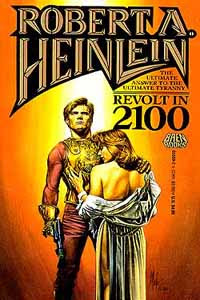
Not sure if this was a profound parable or just a very enjoyable sf story – that is, if it’s a parable, what is it a parable of? Religion? Very good in any case, with some stunning imagery. 4/5
Category Archives: sf
TBTM20080605

Another one for all you Star Trek fans out there, because I know you like it like this:
Star Trek TNG as directed by Kenneth Williams (oo er Mrs).
TBTM20080527

The Top Ten Arthur C. Clarke quotations, including this gem:
“All explorers are seeking something they have lost. It is seldom that they find it, and more seldom still that the attainment brings them greater happiness than the quest.”
Falling in love with Frankenstein

This is a sketch for a much longer essay about science fiction. Click ‘full post’ for text.
One of the dominant themes of Modern culture is the Frankenstein conceit – what you might think of as the ‘mad scientist’, or, more profoundly, the Faustian bargain. A man (and it normally is a man) is so consumed by his rational intellectual pursuits that he unwittingly provokes disaster and his own death.
As I see it, this is the way in which humanity’s soul has digested and absorbed the impact of the Enlightenment. The Enlightenment project is precisely that which has elevated one element of our human nature falsely above the others; it has insitutionalised asophism; and thus we are in the midst of ecological crisis. The devil has come to collect his due.
Being a fan of sf, especially visually, I am struck by the way in which this theme has been subverted and then overcome within the world of fiction and film. I see this as a creative analogue of the way in which the Enlightenment project has itself been undone from within. (This is, I believe, why there is such an efflorescence of angst-ridden writings from the humourless atheists like Dawkins and Hitchens et al – they are aware in their bones that they are being left behind.)
Three examples of this shift:
1. The Matrix trilogy. The first Matrix was pure Frankenstein – the intellectual products of humanity turn against their creators and destruction follows; human liberty and salvation lie in battling against the machine. However, the second two films explored something more creative – the machine is not monolithic, it has variety (and therefore more dramatic interest of course) – there is a possibility of an alliance between human and mecha.
2. Battlestar Galactica, the new series. Whereas in the original series we are facing highly efficient automata (rational products of Enlightenment) now the cylons are riven with their own competing needs and desires. The Cylons are now just like us; we can even breed with them.
3. The Sarah Connor Chronicles. The original Terminator film is a real classic, and a classic description of the Frankenstein – a totally remorseless source of death and destruction ‘it absolutely will not stop until you are dead’. With the films a little first, but now much more with the series, we have much more creative ambiguity. This crystallised for me in the recent episode where Summer Glau starts to learn ballet. A vision of beauty – and whether it is human or mecha falls by the wayside.
(I’ve also been put in mind of this by recently finishing Dan Simmons’ Hyperion cantos, but I’ll write about them separately.)
I believe that what we have in this medium – film and television science fiction – is the creative resolution of the human conflict created by the Western idolatry of reason. As our society moves beyond the Enlightenment, so too does our fiction. Robots who are pure products of reason are no longer very interesting – the robots need to have more to them – and this is simply a mirror for how we see ourselves. In other words, there is more to humanity than the remorseless application of reason.
I find this encouraging and exciting.
Star Wars fans hate Star Wars
At least, the real ones do. The secret is revealed here.
Revolt in 2100 (Heinlein)
For us, the living (Robert Heinlein)
More interesting than good as a novel, this was an unpublished ‘first novel’ in which you can see Heinlein starting to explore the main themes he pursued over the coming years. I’m starting to read – or re-read – a set of Heinlein novels. I’ll write something long about him once I’ve got through the set (it’s my bedtime reading at the moment).
Battlestar Galactica (Season Three)

Awesome stuff, at least four out of five – the series as a whole, dependent on how they spin it, might end up being five out of five – if they manage to harmoniously resolve (ie unite) the human/cylon threads that will be quite some accomplishment.
Can’t wait for the next series. At least I have some things to keep me occupied in the meantime – like Lost 3; Life on Mars 1 & 2; Band of Brothers; Buffy…
Manna for the inner geek
I haven’t watched ANY of the new series yet. I’m waiting until the DVDs get a little cheaper (and I’ve watched some of the other DVDs I have stacked up behind the TV).
(HT SF Gospel)
The Fall of Hyperion (Dan Simmons)

So good I stayed up until 1.15am to finish it. Fulfilled lots of the promise in the first book, leaving enough threads hanging for me to want to pursue the next two. Some astonishing setpieces. If the series continues to build on this foundation it may end up being one of my favourites ever.
Oh yes, lots of good theology in it as well….

